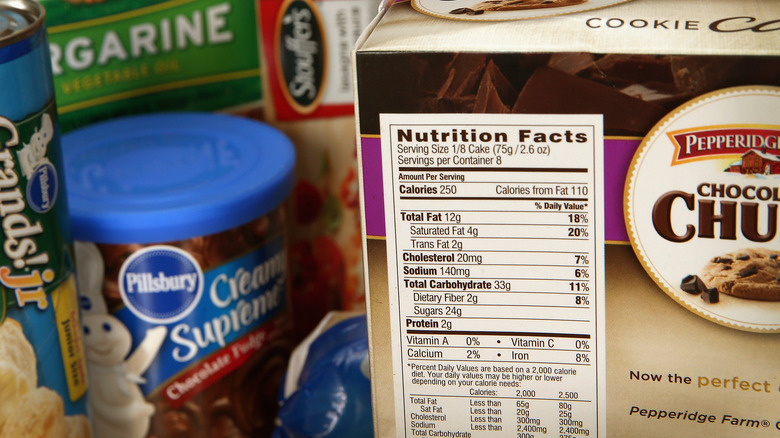Why You Might Be Missing Hidden Trans Fats In Your Food
All fats cannot be treated as equal. It's sometimes unsettling to be reminded of, but it's true. Healthy natural fats like the ones found in a perfectly ripe avocado or in a piece of glistening salmon are not the concern currently in focus. It is trans fats that could really be making a dent in your overall health. And even though they've been heavily regulated, they could be hiding in your food.
According to Live Science, the use of trans fats from an unnatural source in foods has been banned by the Food and Drug administration (or FDA) in the States. This is because of the mounting evidence that continues to show just how negatively trans fats can affect your health. Trace amounts of trans fats are naturally found in animal products, though the majority of trans fats we consume in America are the ones that have been created through the process of hydrogenation. The FDA's new restrictions were viewed as a new hurdle for many manufacturers, as many of them believe hydrogenated fat, or trans fat, is an inexpensive ingredient, adds texture, and extends the shelf life of a product.
As stated by Cooking Light, common foods that include this incredibly unhealthy fat are: vegetable shortenings, some margarines, coffee creamer, refrigerated dough, prepared frostings, crackers, and baked goods. And though the FDA made the decision that all food manufacturers were to remove trans fats from their products, they still might be legally hiding in a few.
Small amounts of trans fats are technically allowed to remain
This is possible if a single portion of food has less than 0.5 grams of trans fats — then the food's manufacturer can round down to zero and legally advertise their products as trans fat-free, shares Cooking Light. 0.5 grams may not be much. But it will add up if you are constantly topping your coffee with coffee creamer containing traces of trans fats. Or if you had a cheat day and just couldn't put that sleeve of crackers down until they were all gone.
Manufacturers may have found a loophole to keep trans fats in the foods we purchase. But it is clear progress towards eliminating these fats for good is being made, and it's not just the FDA ringing the alarm bells. The World Health Organization (or WHO) has also proclaimed their goal to have these unhealthy fats eliminated in every country by 2023, says Cooking Light.
If your aim is to be extra careful and cut even the smallest amounts of trans fats from your diet, then it's time to make reading the ingredients list on the back of products a habit. According to Live Science, it would be wise to look for "partially hydrogenated oils," as that is another term for trans fats. Though progress to banish these unhealthy fats from processed foods for good has been made, it's still up to you to eliminate the trace amounts.


